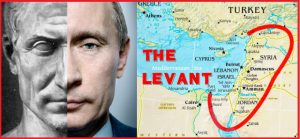Bereft of trade or investments in the Middle East, Putin’s intervention in Syria is pointless great-power posturing, like reported by haaretz.com
As the United States and Russia trade barbs over the Syrian chemicals weapons and the U.S. missile attacks, it’s a good time as ever to ask the fundamental question: What is Russia doing in Syria in the first place?
The usual answers trotted out are that Moscow is determined to root out the threat of Islamic fundamentalism before it reaches Russia’s Muslim minority, which comprises 7 percent of the population. Or, that Putin hopes fighting ISIS will distract the West from its maneuverings in Ukraine. Or, that Moscow needed to prop up the regime of Bashar Assad to ensure Russia could continue to operate its naval base in Tartus.
But No. 1 on the list of Putin’s agenda items was to restore his country’s status as a player in the Middle East. He just wanted to show the world that Russia is no less a superpower than it was during the good old days of the Cold War.
Eighteen months later, the results have been mixed, at best.
The Assad regime is back from the brink of defeat at the hands of the rebels. Not only does Russia have Tartus: it added an airbase at Latakia.
On the other hand, the West hasn’t shown much inclination to ease the sanctions it imposed over Russia’s invasion of Ukraine, and the St. Petersburg subway bombing on April 4 shows that Russia still faces the threat of Islamic extremism. And, the sudden U.S. missile attack on Syria following the Assad regime’s alleged use of chemical weapons abruptly halted the warming relations with the Trump White House.
Smoke, mirrors and fire
Yet regarding Russia’s great power status, Putin has certainly won the image war. The conventional wisdom is that Moscow is now the go-to address to get things done in Syria and that its status in the region has risen.
Unlike the feckless Americans, Russia has shown that it comes to the aid of its friends without raising pesky objections over human rights, democracy or even the use of chemical weapons.
The region’s dictators and monarchs should easily prefer Moscow over Washington as an ally and benefactor, although there is little sign that they are doing that. My guess is that they understand that Moscow’s great power status is all about the smoke and none about the fire.
Putin’s thinking seems to be that you assume the mantle of great power status by sending fighter jets to a distant war, launching cruise missiles that can hit their targets 900 miles away and dispatching an (admittedly decrepit) aircraft carrier to the Mediterranean. But it’s all empty posturing.
Russia has no interests in the Middle East except to be interested in it. Real interests begin with guys and girls in suits carrying briefcases filled with contracts to build and sell things. Only later do the generals, warships and airbases arrive to help protect them.
Trade and investment is what bring a distant power like the U.S., Europe or China to a region like the Middle East. Military involvement follows.
Putin hasn’t just put the cart before the horse, he doesn’t have much of a horse to begin with.
Nukes and wheat
Russia is for all intents and purposes an underdeveloped economy, with little to offer the world apart from arms, nuclear power technology, energy and wheat.
As far as those go, Russia hasn’t done badly for itself. Last year it topped the U.S. for exports of the grain for the first time in decades and is now the supplier of choice to Egypt. Russian arms sales to the Middle East and North Africa amounted to $12.7 billion from 2006 to 2015, double the level of the previous decade.
Yes, Russia also has agreements to build nuclear power plants in Egypt and Jordan, and Iran is eyeing a Russian-developed expansion if its Bushehr facility. Russian energy companies are active in Egypt and Iraq.
Moscow has used Syria to showcase its portfolio of weapons, but as marketing campaigns go, that’s an expensive one and might not yield much in the way of deals.
It is true that Russia has signed arms deals with Egypt and has even gotten a toehold in the Gulf, but that has little to do with the prowess of Russian weaponry in the Syrian civil war and a lot more to do with the West’s hesitance to sell weapons to oppressive regimes.
As for the nuke deals Moscow signed with Egypt, they aren’t economically viable, and Egypt doesn’t even need them, it turn sout, after finding large fields of natural gas offshore. It’s hard to see Mideast powers opting for Russian energy companies over their more technologically sophisticated Western peers.
In any case, by great-economic-power standards, none of this adds up to much.
The EU and China, or for that matter South Korea and Japan, have much deeper and wider business interests than Russia in the region, but they don’t win contracts (of for that matter eat up their profits) by sending troops into the region. Wisely, they let the U.S. do that. And, even the U.S. has come to recognize the cost-benefit of intervening in the region’s problems. Washington spent a $2 trillion by some estimates in Iraq and got nary an order nor an ally in return.
If she hasn’t learned it yet, Russia will sooner or later realize that power arises from the pocketbook, not from the barrel of a gun.



